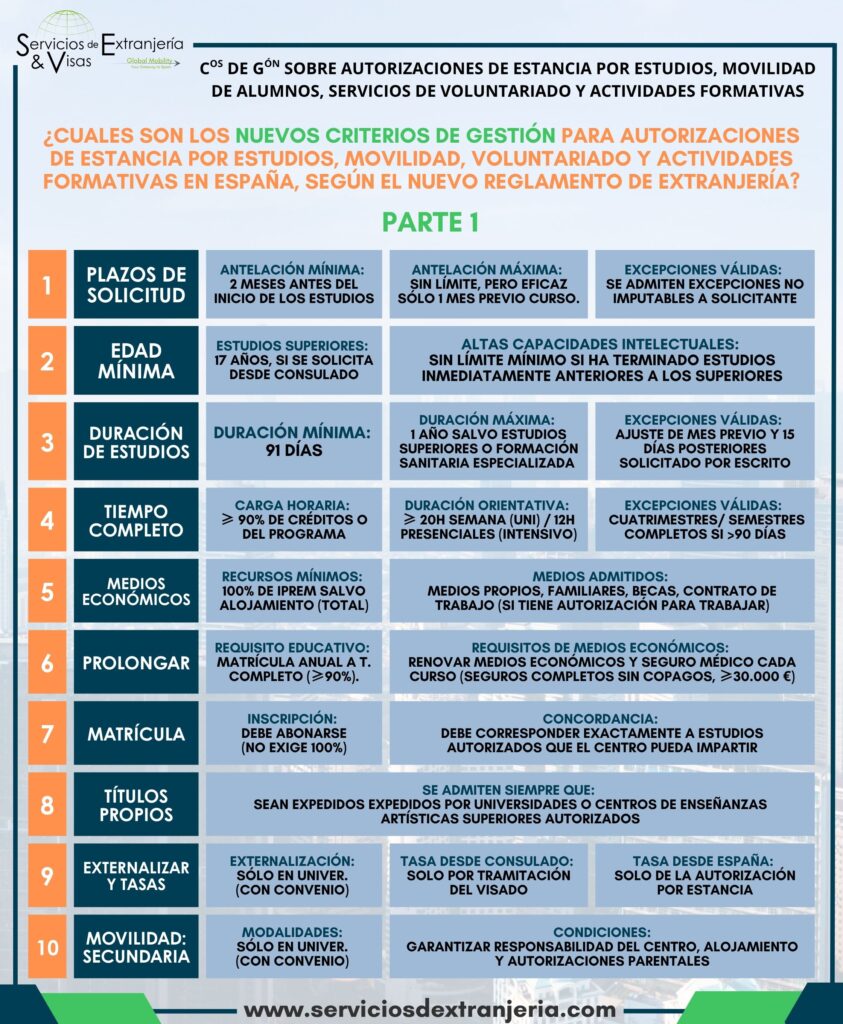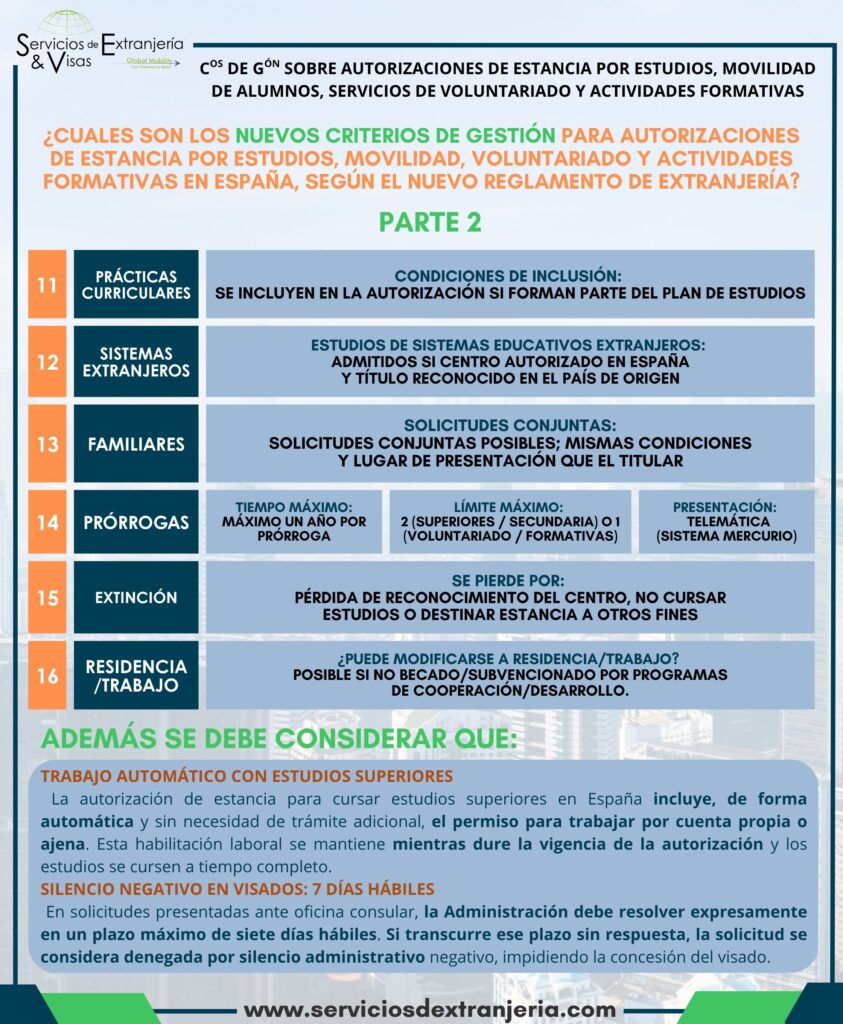Student Visa Spain 2025: Key Rules for Non-EU Students

From 20 May 2025, Spain opens a new chapter for international education. The updated Immigration Regulation (Royal Decree 1155/2024) replaces the old 2011 rules, offering a clearer, more flexible path for those dreaming of studying here. The information you will find in this guide is drawn directly from the official management criteria set out in the Ministry of Migration’s internal instruction “Criterios de gestión sobre autorizaciones de estancia por estudios, movilidad de alumnos, servicios de voluntariado y actividades formativas”, which details how the new rules will be applied in practice. Whether you’re aiming for a university degree, professional training, a language course or even volunteering, this is the perfect time to explore the opportunities Spain now offers. In the following sections, we walk you through the essentials – deadlines, age limits, course length, full-time requirements, finances, insurance, enrolment, eligible programmes, and even family options – so you can prepare a strong, successful student visa Spain 2025 application. So, which are the main criteria?
Application Timing
Timing is everything. The golden rule is to apply at least two months before your course starts, whether you’re applying from abroad or from within Spain. If life throws in surprises – a last-minute scholarship, an unexpected offer from a waiting list, or delays in getting documents – the authorities can be flexible, as long as you provide proof. You can even apply well ahead of time; just know that your permit will kick in one month before your course begins. And if you’re already in Spain, make sure you apply two months before your current legal stay ends, so your plans continue without interruption.
Age Requirements
Spain welcomes students of all ages, but there are rules. For higher education, you’ll usually need to be 18, though 17-year-olds can apply from a Spanish consulate abroad. Exceptionally talented students who’ve finished their studies early can also qualify with official proof of their advanced abilities. If you’re under 18, your options include joining a recognised secondary school exchange, enrolling under a humanitarian schooling programme, or being one of those select 17-year-olds heading to university.
Course Duration and Validity of Authorisation
Short holiday courses won’t do – your programme must run for at least 91 days. For most students, the permit matches the course length, up to one year. But here’s the good news: multi-year authorisations are now available. If you’re starting an official university degree, your permit can cover the full duration – no more annual renewals. The same applies to specialised health training. And if you prefer, you can request your permit to match your course dates exactly, just remember to adjust your insurance accordingly.
Full-Time Study Requirement
Part-time study won’t open the door to a Spanish student visa – you need to commit fully. For university programmes, that means enrolling in at least 90% of the usual credits; for other studies, 90% of the total hours. Typically, that’s around 20 hours per week, but if you’re in an intensive or hybrid programme, you’ll need at least 12 in-person hours plus assessed coursework. Even semester-based enrolments are fine, as long as they’re structured for full-time engagement.
Financial Means
Living in Spain is amazing, but you have to prove you can afford it. The standard is 100% of the IPREM per month (about €600 in 2025), plus extra if you’re bringing dependants. You can show this through savings, family support, scholarships, or – if you’re in higher education – even a confirmed job offer, as your permit will now allow you to work. If your accommodation is prepaid or provided free by close family (with documents to prove it), this counts towards your resources. For university students, part-time work can help you meet the requirement too.
Health Insurance
Spain takes your health seriously. You’ll need full coverage for your entire stay – no co-pays, no waiting periods, and at least €30,000 in coverage if there’s a cap. The insurance company must be authorised to operate in Spain, and many students choose specific “visado de estudiante” policies that tick all the boxes. If you’ll be working and are registered with Social Security, that can also meet the requirement, but having a compliant private policy from the start keeps things simple.
Admission and Enrolment
Your dream programme needs to be more than just a wish – you must be officially admitted to an authorised course at a recognised institution. A formal acceptance letter is essential, and paying the enrolment or registration fee is enough to prove your commitment; you don’t have to pay all tuition up front. Just make sure the course title matches exactly what the institution is authorised to offer, because the visa is tied to those specific studies.
Externalised Training
Sometimes universities partner with other institutions to deliver part of a programme. Under the new rules, only universities can do this, and only for non-official courses (títulos propios). If your studies are split between two places, the university must provide a certificate naming the partner, describing the programme, and explaining how quality is monitored. This also applies to university-run language courses delivered through accredited partners.
Recognised Programmes
Spain’s 2025 rules open the door to a wide variety of study options. These include official and non-official higher education degrees and diplomas, post-compulsory secondary education for students aged 18+, secondary school exchange programmes for younger students, volunteering with registered organisations, official language assistant positions, language courses at Official Language Schools or accredited centres, preparatory courses for specialised health training, professional licensure programmes, and vocational certificates (levels 2 and 3). If it’s recognised and full-time, there’s a strong chance it qualifies.
Family Members
Studying abroad doesn’t have to mean leaving loved ones behind. If you’re enrolled in higher education or specialised health training, your spouse or registered partner, and your children, can apply to join you – provided you can show you have the resources to support them during their stay in Spain.
In Conclusion…
The student visa Spain 2025 rules are a step forward: longer permits for degree students, built-in work rights, and a broader choice of recognised activities make Spain even more attractive to non-EU students. Success comes down to getting the timing right, enrolling full-time in an authorised programme, showing solid finances and insurance, and ensuring your paperwork is complete and consistent. If you’re ready to start your academic journey in Spain, take advantage of this moment. For expert guidance and the latest requirements, visit Servicios de Extranjería and move one step closer to making your Spanish study dream a reality.









